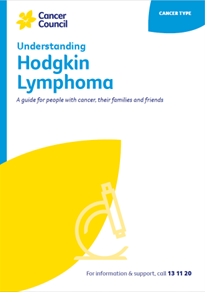- Home
- Hodgkin lymphoma
- Diagnosis
- Staging and prognosis
Staging and prognosis for Hodgkin lymphoma
Staging is a way of describing how far Hodgkin lymphoma has spread throughout the body. Using these tests, your doctor can work out the stage of cancer and recommend treatment.
Learn more about:
Staging
Stages 1 and 2 are considered early-stage lymphoma, and stages 3 and 4 are considered advanced-stage lymphoma (see table below).
Each stage is also given a letter (A or B) based on whether you have specific symptoms:
- The letter A means you have none of the B symptoms (listed below).
- The letter B means you have fever, night sweats and/or unexplained weight loss (typical lymphoma symptoms).
Hodgkin lymphoma stages
| stage 1 | one lymph node area is affected, either above or below the diaphragm |
| stage 2 | two or more lymph node areas are affected on the same side of the diaphragm |
| stage 3 | at least one lymph node area above and at least one lymph node area below the diaphragm are affected |
| stage 4 | lymphoma is in multiple lymph nodes and has spread to other parts of the body (e.g. bones, lungs, liver) |
Risk categories
Your doctor will consider the stage along with the results of blood tests and imaging scans to work out how the Hodgkin lymphoma is likely to respond to treatment. This may be called the risk category.
Early-stage Hodgkin lymphoma may be categorised as “favourable” or “unfavourable”. In unfavourable cases, more treatment may be needed to reduce the risk of relapse (when disease returns after a period of improvement). The signs of early-stage unfavourable Hodgkin lymphoma include:
- many affected lymph nodes
- larger lymph nodes (may be called bulky disease)
- inflammation in the blood
- the presence of B symptoms.
Advanced Hodgkin lymphoma is generally categorised as high risk.
Prognosis
Prognosis means the expected outcome of a disease. You may wish to discuss your prognosis and treatment options with your haematologist (or medical oncologist if they are your main treating specialist). It is not possible for anyone to predict the exact course of the disease in an individual person. Instead, your doctor can give you an idea about the common issues that affect people with your type of Hodgkin lymphoma.
To work out your prognosis, your doctor will consider:
- your test results
- the type of Hodgkin lymphoma you have
- the stage and risk category
- how well the Hodgkin lymphoma responds to treatment (you will have tests throughout your treatment that show how well the treatment is working)
- your age, fitness and medical history.
Hodgkin lymphoma usually responds well to treatment, and most people who are treated for Hodgkin lymphoma (including advanced disease) go into remission. This means the symptoms of Hodgkin lymphoma disappear and the doctor can’t find any sign of the disease during a physical examination or on imaging tests.
During remission, you will need regular check-ups to ensure that you are still healthy, and the lymphoma hasn’t returned.
In a small number of cases, Hodgkin lymphoma may not respond to the initial treatment, which is known as refractory disease, or it may come back (relapse or recur) after remission.
See Stem cell transplant, and targeted therapy and immunotherapy, for information about treatment for refractory or relapsed disease.
I now understand what they mean by ‘information means control’. Seeking accurate, reliable information was a huge coping strategy for me.
Sonya
→ READ MORE: Your health care team
Podcast: Tests and Cancer
Listen to more episodes of our podcast for people affected by cancer
More resources
Prof Mark Hertzberg AM, Head, Department of Haematology, Prince of Wales Hospital; Dr Puja Bhattacharyya, Haematology Staff Specialist, Western Sydney Local Health District – Blacktown Hospital; A/Prof Susan Carroll, Senior Staff Specialist, Radiation Oncology, Royal North Shore Hospital and University of Sydney; Gerry Flanagan, Consumer; Alisha Ganesh, Haematology Clinical Nurse Consultant, Concord Repatriation General Hospital; Kelly King, Cancer Council Liaison, Central Coast Cancer Centre; Ilana Krug, Social Worker – Haematology and Oncology, Gosford Hospital; Amy McGee, Consumer.
View the Cancer Council NSW editorial policy.
View all publications or call 13 11 20 for free printed copies.

